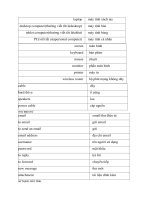Ngữ pháp tiếng Anh 12 bài 3
Bạn đang xem bản rút gọn của tài liệu. Xem và tải ngay bản đầy đủ của tài liệu tại đây (61.87 KB, 5 trang )
Ngữ pháp tiếng Anh 12 bài 3 (Câu gián tiếp)
Câu gián tiếp: ( Reported speech / Indirect speech )
-Câu gián tiếp dùng để tường thuật lại lời nói trực tiếp từ người
thứ nhất đến người thứ ba thông qua người thứ hai
Một số lưu ý khi chuyển từ câu trực tiếp sang câu gián tiếp:
1.Cần nhớ các cách thay đổi:
-Thay đổi về thì: Thông thường , động từ trong câu gián tiếp sẽ
đ ược lùi về một thì so với câu trực tiếp
Direct Speech Reported Speech
Simple
present Simple past
Present
continuous Past continuous
Present perfect Past
perfect
Simple
past Past perfect
Past
continuous Past perfect
continuous
Simple
future Future in the
past ( S + would + V)
Conditional sentence type
1 Conditional sentence type 2
Conditional sentence type
2 Unchanged
Conditional sentence type 3
-Đổi các từ chỉ thời gian và nơi chốn sao cho nghĩa các câu gián
tiếp hợp lý , rõ ràng
Direct speech Indirect speech
This That
These Those
Here There
Now Then
Today That day
Ago Before
Tomorrow The next day / The
following day
The day after tomorrow In two days'
time
Yesterday T
he day before / The previous day
The day before yesterday Two days
before
Next
week The following week /The
next week
Last week The
previous week/ The week before
Last
year The previous year / the
year before
2. Câu mệnh lệnh và câu yêu cầu: thường dùng các động từ sau
trong câu gián tiếp:
told, asked, ordered, suggested
-Tell sb to do something
-Ask sb to do something
-Order sb to do something
-Suggest that sb should do / do something
-Suggest + Ving
-Suggest sb doing something
Eg1: He said to me: “Do it”
He told me to do it
Eg 2: He said to me :" Telephone me, please "
He asked me to telephone him
Eg3: “Don't be late for the meeting tomorrow”, he said to them
He told them not to be late for the meeting
the following day
Eg 4: “Be calm , will you?” she said to us
She ordered us to be calm
Eg 5: “ Let 's go swimming now” they said
They suggested that they should go swimming
then
Eg 6: They said:” Let 's not drink a lot of wine when we feel
tired
They suggested not drinking a lot of wine
when we feel tired
Eg 7: She said: “ Let him go to school”. “ He will be late for
school”
She suggested him going to school
3.Câu hỏi trong lời nói trực tiếp:
a. Câu hỏi bắt đầu WHO, WHOM, WHAT, WHICH, WHERE,
WHEN, WHY, HOW
Chú ý : Đảo chủ ngữ lên trước động từ chính, bỏ trợ động từ
Eg 1: “What is you name?” my teacher asked me
My teacher asked me what my name was
Eg 2: “ Where does she live?” they said to me
They asked me where she lived
Eg 3: “ Why did you go to school late?” he said to me
He asked me why I had gone to school late
b.Câu hỏi với YES- NO question như : BE, HAVE, HAD, CAN,
COULD, DO, DOES : dùng Whether hoặc If
Eg 1: “Is she your sister?”Miss Hoa asked me
Miss Hoa asked me if she was my sister
Eg 2: The police said to her “ Can you drive?”
The police asked her if she could drive
Eg 3: “ Does Alice understand Vietnamese?” they wanted to
know
They wanted to know if / weather Alice
understood Vietnamese
Lưu ý: Whether dùng để diễn tả sự lựa chọn và được thay
thế bởi “or”
Eg 1: Do you want to go by air or or by sea ?
He asked whether I wanted to go by air or by
sea
Eg 2: Do you want to ensure your car or not?
He asked whether or not I wanted to ensure my
car or not
c.Câu cảm thán:
-Các câu cảm thán dùng những động từ như : exclaim, greet,
remark, cry out , complain, tuỳ theo nghĩa của câu cảm
thán
Eg1 : “What a beautiful skirt”
She exclaimed that the skirt was beautiful
Eg 2: “ Hello ,John! Where are you going now?” she said
She greeted John and asked him where he was
going then
Eg 3: “ Oh! I have lost all money” he cried
He cried out that he had lost all of money
Eg 4 : “ Oh dear, my toothache is getting worse” she said
She complained that her toothache is getting
worse
Eg 5 : “ Good!” he exclaimed
He gave an exclamation that her toothache was
getting worse
Eg 6: He said to me: “ Thank you very much”
He thanked me very much
Eg 7 : They said to tourists: “ Welcome!”
They welcomed tourists
Eg 8: He said : “ Happy birthday”
He wished me happy birthday
Eg 9 : They said : “Clown”
They called me a clown
d.Shall/ would dùng để diễn tả một yêu cầu:
Eg 1 : “Will you help me, please?” she told me
She asked me to help her
Eg 2:” Will you lend me your English dictionary?” Mai told me
Mai asked me to lend her my English dictionary
e. Shall / Would dùng để diễn tả một đề nghị , một lời mời
Eg 1 : “ Shall I bring you some food?” the waiter said to me









